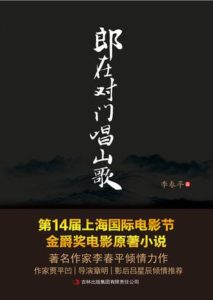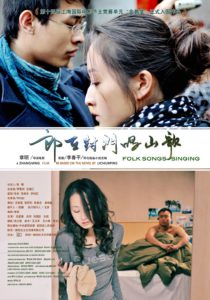Folk Songs Singing
郎在对门唱山歌
China, 2011, colour, 1.85:1, 107 mins.
Director: Zhang Ming 章明.
Rating: 6/10.
Realistic drama of a young woman’s infatuation loses its grip only in the final reels.
Ziyang county, Ankang municipality, southern Shaanxi province, south of Xi’an, China, the present day. At a Mid-Autumn Festival celebration at the home of deputy police chief Liu Zaishui (Feng Guoqing) by the banks of the Han River, his teenage daughter Liu Xiaoyang (Lv Xingchen), who is studying singing, is attracted by Feng Gang (Jie Ke), a music teacher who has recently returned from Beijing. As part of the celebration, Feng Gang conducts the Ziyang Folk Song Troupe in a performance of A Young Man across the Way Is Singing Folk Songs 郎在对门唱山歌. The two later get to know each other and Feng Gang ends up coaching Liu Xiaoyang at her home. Feng Gang lives in a rather shabby house the other side of the river, with his sick mother and a young woman from his native village. Liu Xiaoyang’s father is uneasy over her friendship with Feng Gang, as he’s under pressure from county head Zhang to pair her off with the latter’s son, sports student Zhang Xuefeng (Sun Kai), and have them both attend the local Ankang Institute. Liu Xiaoyang, however, wants to study farther afield, in either Xi’an or Beijing, and will not be dissuaded from her infatuation with the quiet and serious Feng Gang. Several years later, Liu Xiaoyang, who’s back in town after studying at college, is spending all her time with Feng Gang and is a member of the local folksong troupe that he still conducts. She remeets Zhang Xuefeng, who went on to join the navy and has just been honourably discharged. Liu Xiaoyang’s father is now police chief and Zhang Xuefeng’s father has become party secretary, but the former still cannot persuade his daughter to give Feng Gang up. Zhang Xuefeng, however, won’t give up on his dream of him and Liu Xiaoyang getting married, even though Liu Xiaoyang makes her feelings plain to him.
REVIEW
The career of director Zhang Ming 章明 – which started with the impressive Yangtze-set atmosphere piece In Expectation 巫山云雨 (1996, aka Stormclouds over Wushan), but then slid ever-downwards with Weekend Plot 秘语十七小时 (2001) and Before Born 结果 (2005)  – bounces back, despite a few weaknesses, with Folk Songs Singing 郎在对门唱山歌, a realistic drama of a young woman’s infatuation that hitches Zhang’s gift for sketching emotional moods with a strong performance from actress Lv Xingchen 呂星辰. Adapted from a 2007 novella by Shaanxi writer Li Chunping 李春平 (see left), and set in his native region of Ankang, famous for its folk-song traditions, the movie combines a strong sense of local flavour from Zhang’s realistic direction with a story that engages the viewer on an emotional level more than any of his previous films.
– bounces back, despite a few weaknesses, with Folk Songs Singing 郎在对门唱山歌, a realistic drama of a young woman’s infatuation that hitches Zhang’s gift for sketching emotional moods with a strong performance from actress Lv Xingchen 呂星辰. Adapted from a 2007 novella by Shaanxi writer Li Chunping 李春平 (see left), and set in his native region of Ankang, famous for its folk-song traditions, the movie combines a strong sense of local flavour from Zhang’s realistic direction with a story that engages the viewer on an emotional level more than any of his previous films.
Starting with an ensemble sequence of a Mid-Autumn Festival gathering that introduces all the main characters, as well as the social and political background between them in the riverside town of Ziyang, the movie gradually moves the protagonist of a local deputy police chief’s daughter into the foreground as she develops an infatuation for a music teacher newly arrived back home to look after his sick mother. The teenage Liu Xiaoyang’s liking for the quiet Feng Gang is shown in a restrained, slightly stylised way – with her always addressing him as “teacher Feng” – and through scenes of him coaching her in folksong singing; and it’s he rather than she who is the more cautious partner, deeming this or that action as socially “inappropriate”. Only in the second half, set an unspecified number of years later, do the various emotions break through the surface, as another suitor (with a politically powerful father) makes his move on Liu Xiaoyang.
Many of the film’s strengths are due to the strong performance as the wilful Liu Xiaoyang by Lv, a 20-year-old dance and music student from Zhejiang province making her acting debut. (She’s currently [summer 2011] shooting her second movie, Lost Time 十爱 [2012], also with Zhang.) Her scenes with TV veteran Feng Guoqing 冯国庆, as Liu Xiaoyang’s indulgent but nervous father, are among the best in the movie, especially one in which she makes him write a formal “confession” for hiding a spy camera in her room and another in which he asks her whether her infatuation for Feng Gang is really “love” as she claims. Without overplaying her role, Lv makes her character into a touchingly doomed figure, and also gets good support from Sun Kai 孙凯 as her rather doltish, unwished-for suitor.
The film’s main weaknesses are the casting of Jie Ke 杰珂 as the totally charmless object of Liu Xiaoyang’s infatuation, and the script’s lack of any explanation for her interest in him (apart from finding him “handsome”). The drama’s final act is also not on the same level as the previous hour. An unexpected bonus, however, is the atmospheric piano music by Wen Zi 文子, underscoring the unforced photography of Wu Lixiao 吴立晓.
The Ziyang folk song of the title refers to a distant, idealised longing. The film is also known under the clumsy and ungrammatical English title The Young Man Sings Folk Song in the Opposite Door.
CREDITS
Presented by Shaanxi Sunny Way Culture Media (CN). Produced by Shaanxi Sunny Way Culture Media (CN).
Script: Zhang Ming. Novella: Li Chunping. Photography: Wu Lixiao. Editing: Tian Lei. Music: Wen Zi. Art direction: Wang Hanjun, Wang Daxiong. Sound: He Bin.
Cast: Lv Xingchen (Liu Xiaoyang), Jie Ke (Feng Gang), Sun Kai (Zhang Xuefeng), Feng Guoqing (Liu Zaishui, Liu Xiaoyang’s father).
Premiere: Shanghai Film Festival (Competition), 15 Jun 2011
Release: China, 18 Nov 2011.
(Review originally published on Film Business Asia, 14 Aug 2011.)
